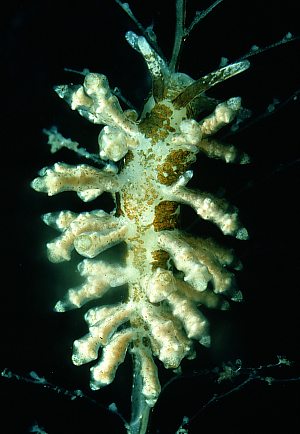
Eubranchus doriae
(Trinchese, 1874)
Order: NUDIBRANCHIA
Suborder: AEOLIDINA
Family: Eubranchidae
DISTRIBUTION
Known from western Mediterranean, Atlantic coast of France, south and south-western coasts of British Isles. See Forum for record also from Norway.
PHOTO
Mulroy Bay, Co. Donegal, Ireland - March 1981 - 12mm. Photo: B.E.Picton
See Bernard Picton's message on Eubranchus spp in North Atlantic.
See also Bernard Picton's message identifying a photo of Kåre Telnes, from Norway as E. doriae.
Reference:
• Trinchese, S. (1874). Descrizione di alcuni nuovi Eolididei del Porto di Genova. Mem. (R.) Acad. Sci. Inst. Bologna 4(3): 197-203
Rudman, W.B., 2002 (June 6) Eubranchus doriae (Trinchese, 1874). [In] Sea Slug Forum. Australian Museum, Sydney. Available from http://www.seaslugforum.net/find/eubrdori
Related messages
Eubranchus doriae and eggs
July 4, 2006
From: Marina Poddubetskaia Ossokine
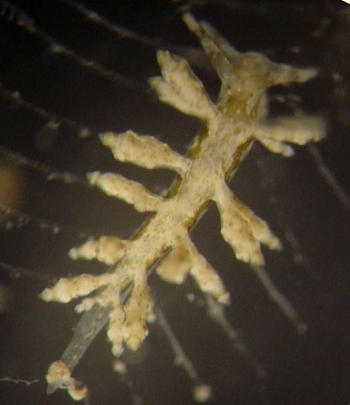
Dear Bill,
Here is another record of Eubranchus doriae from the Mediterranean coast of France. This species was found on the same hydroid, at the same site (but not in the same place) as Eubranchus prietoi.
Locality: 'La digue', Port-Leucate , 3m, France, Mediterranean, 24 June 2006. Length: animal : 6mm / eggs : 1+2mm . Photographer: Marina Poddubetskaia Ossokine.
The photos of eggs I have included, confirm the egg-ribbon laid by the animal from Cerbere above the large Doto egg-ribbon (see message #10589 ). All these eggs seem relatively large. Does it mean this species has a direct development ?
Best wishes,
Marina.
Nembro website
nembro@nembro.info
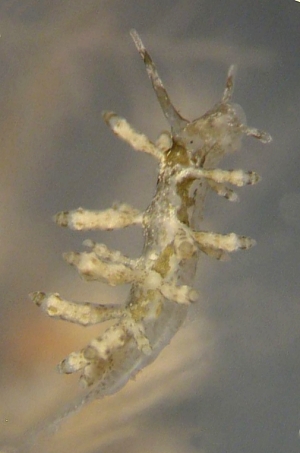
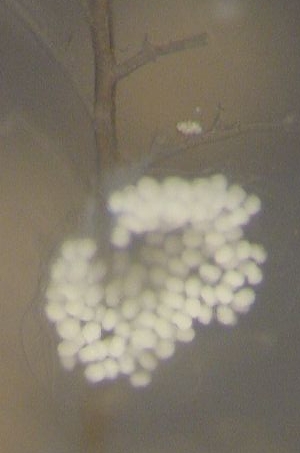
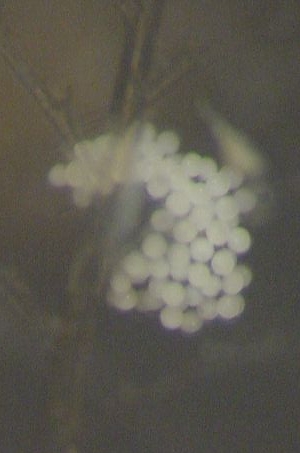
Dear Marina,
Thanks for this find. It certainly confirms your earlier thoughts. Comparing the size of these eggs with those of Doto floridicola in your earlier message, I am pretty sure these are the eggs of a direct developer. If not a direct developer, then perhaps one in which the larvae don't feed in the plankton before settling down and metamorphosing. As a whole, these lecithotrophic non-feeding veligers have intermediate sized eggs. However, as I am sure you have guessed, the only way to be sure is to find some hatching out of the egg ribbon
Best wishes,
Bill Rudman
Eubranchus doriae from French Mediterranean
July 30, 2003
From: Marina Poddubetskaia
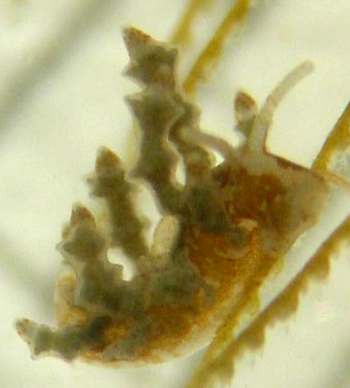
Dear Bill,
During one dive in Cerbere I collected a branch of Aglaophenia with Doto floridicola egg-ribbon on it [lower right photo] and a tiny animal which I believed to be Doto. You could imagine my astonishment when I saw in laboratory that this animal was Eubranchus and not Doto !
Here are some photos of it. I think it is Eubranchus doriae. Could you confirm this ID, please ? I kept this Aglaophenia several days in the tank and Eubranchus has never been outside it. And yet it doesn't seem to be its food ?! Moreover, in the lower right photo you can see some small eggs near the larger Doto floridicola egg-ribbon. I didn't see them at the beginning, so I believe they were laid by Eubranchus in the tank.
Date: July 06, 2003
Location: Cerbere, France, Mediterranean coast
Site : Sec de Joel
Depth: 29m
Size: 4-5mm
Photos: Marina Poddubetskaia - Nembro website
Best regards,
Marina.
nembro@nembro.info
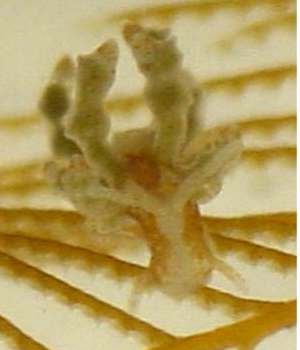
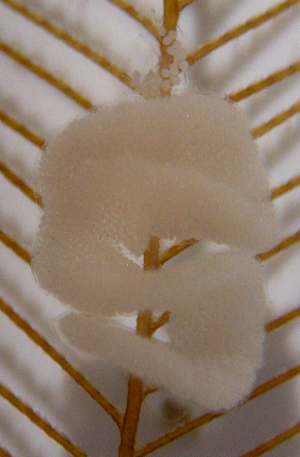
Dear Marina,
I agree this is most probably Eubranchus doriae. I first thought the eggs just above the Doto egg ribbon were part of that ribbon but the eggs are definitely about twice the diameter of the Doto eggs. Definitely an interesting observation
Best wishes,
Bill Rudman
Eubranchus doriae from the British Isles
June 7, 2002
From: Bernard Picton

Dear Bill,
To accompany my message on Eubranchus, here is a photo of Eubranchus doriae.
I see from Thompson that this species is reported to feed on Plumularia setacea. This has not been my experience, I've found it on Kirchenpaueria similis. Given the difficulty in identifying these hydroids I'd question the P. setacea reports. Thompson also gives much smaller max. size than I've found - this is a mature one.
PHOTO: Mulroy Bay, Co. Donegal, Ireland - March 1981 - 12mm. Photo: B.E.Picton
Bernard
bernard.picton.um@nics.gov.uk
Picton, B. , 2002 (Jun 7) Eubranchus doriae from the British Isles. [Message in] Sea Slug Forum. Australian Museum, Sydney. Available from http://www.seaslugforum.net/find/7154Thanks Bernard,
Bill Rudman
